Skip to comments.
Syrian Conflict Imperils Historical Treasures
New York Times ^
| August 15, 2012
| Patricia Cohen
Posted on 08/18/2012 11:04:45 PM PDT by SunkenCiv
Preservationists and archaeologists are warning that fighting in Syria's commercial capital, Aleppo -- considered the world's oldest continuously inhabited human settlement -- threatens to damage irreparably the stunning architectural and cultural legacy left by 5,000 years of civilizations.
Already the massive iron doors to the city's immense medieval Citadel have been blown up in a missile attack, said Bonnie Burnham, president of the World Monuments Fund, an organization that works to preserve cultural heritage sites...
President Bashar al-Assad's forces have been shelling the city, and in recent days his army has taken up positions inside the Citadel, trading fire with insurgents through the castle's arrow loops, according to news reports. Built on a massive outcropping of rock, the easily defended Citadel has been an important strategic military point for millenniums and is once again serving that function.
Among the significant archaeological sites endangered is the Temple of the Storm God, which dates from the third to the second millennium B.C. and which Ms. Burnham identified as one of the oldest structures in the world. Never opened to the public, the recently discovered temple and its huge carved reliefs are protected only by sandbags and a flimsy corrugated tin roof, she said.
Aleppo's labyrinthine streets reveal a microcosm of human history. Beneath the Citadel are remains of Bronze Age friezes and Roman fortresses. The entire walled Old City, with its 12th-century Great Mosque, thousands of pastel-colored medieval courtyard houses, Arab souks and 17th-century stone madrasas, an Ottoman palace and hammams, is recognized as a World Heritage Site by Unesco, the United Nations cultural arm.
(Excerpt) Read more at nytimes.com ...
TOPICS: History; Science; Travel
KEYWORDS: 19thdynasty; 25thdynasty; aegean; aleppo; anatolia; boghazkoy; emilforrer; godsgravesglyphs; hattusa; hattusas; hittite; hittites; syria; templeofthestormgod
This is obviously just Sunni agitprop -- President Assad has always been tolerant and protective of extinct ancient religions. /s
The walled Old City overlooks Aleppo, a Syrian city where recent fighting has been fierce. Within the Old City is the Citadel, a structure that stands atop an ancient temple, the site of an excavation. [Salah Malkawi for The New York Times]

1
posted on
08/18/2012 11:04:53 PM PDT
by
SunkenCiv
2
posted on
08/18/2012 11:05:35 PM PDT
by
SunkenCiv
(https://secure.freerepublic.com/donate/)
To: StayAt HomeMother; Ernest_at_the_Beach; decimon; 1010RD; 21twelve; 24Karet; 2ndDivisionVet; ...
|
| GGG managers are SunkenCiv, StayAt HomeMother & Ernest_at_the_Beach |
|

|
Temple of the Storm God by Andrew Lawler [2009] -- Repeatedly rebuilt by Arabs and Ottomans, Aleppo's citadel was ravaged by Mongols in A.D. 1260 and destroyed by Tamerlane in 1401. (Courtesy Aga Khan Historic CIties Program)
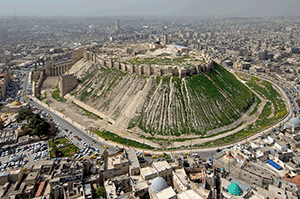
To all -- please ping me to other topics which are appropriate for the GGG list. |
|
3
posted on
08/18/2012 11:13:43 PM PDT
by
SunkenCiv
(https://secure.freerepublic.com/donate/)
One that got by the NY Times editor:
for millenniums
s/b "for millennia".
4
posted on
08/18/2012 11:16:49 PM PDT
by
SunkenCiv
(https://secure.freerepublic.com/donate/)
To: SunkenCiv
I look at all this history, architecture, art, archaeology, and all that I can think of is, Zombies couldn’t get you there.
5
posted on
08/19/2012 12:09:05 AM PDT
by
ansel12
(Massachusetts Governors, where the GOP goes for it's "conservative" Presidential candidates.)
To: SunkenCiv
You’re way behind. Latin plurals are right out, and have been for years. Well, Webster’s Seventh, Ninth, and Eleventh Collegiate Dictionaries ( 1963, 1984, 2003 ) all list “millennia or millenniums,” but the various style manuals have all gone for english pluralizations, I believe.
6
posted on
08/19/2012 12:25:07 AM PDT
by
dr_lew
To: SunkenCiv
"...the massive iron doors to the city's immense medieval Citadel have been blown up in a missile attack Never bring massive iron doors to a missile fight.
7
posted on
08/19/2012 12:44:50 AM PDT
by
BlueDragon
(going to change my name to "Nobody" then run for elective office)
To: BlueDragon
If yo ask me, “massive iron doors” sound like they are just begging for a missile attack.
8
posted on
08/19/2012 6:40:11 AM PDT
by
BenLurkin
(This is not a statement of fact. It is either opinion or satire; or both)
To: dr_lew
the various style manuals have all gone for english pluralizations, I believe. Yeah, if you're not winning give up.
It was all over when Star Trek N.G. featured a (single) character named Data. But if datum is awkward, datas is even more so.
To: SunkenCiv
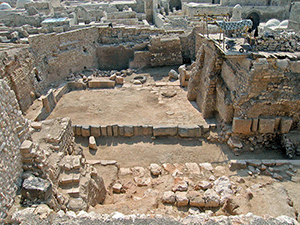
Temple of the Storm God - Archaeology, November 2009
A 5,000-year-old sanctuary emerges - The remains of a Bronze Age temple dedicated to
the storm god Adda were discovered beneath Aleppo's Ottoman citadel.
...it was first constructed by Early Bronze Age peoples, then rebuilt by a succession of cultures,
including the Hittites, the Indo-European empire-builders whose domain spread from Anatolia
to northern Syria in the 14th century B.C. Through the millennia, as Syrian, Anatolian, and
Mesopotamian cultures mixed and blurred at this ancient crossroads, Adda was known variously
as Addu, Teshup, Tarhunta, and Hadad. But as artistic styles and languages came and went,
the storm god's temple endured.
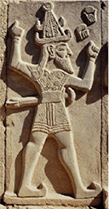 <>
<>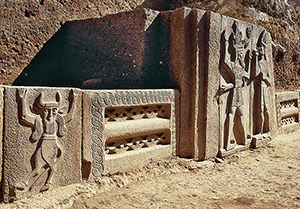
Among the reliefs excavated at the site are 14th-century B.C. depictions of Adda (left)
and fantastical beasts such as a half-man half-bull.
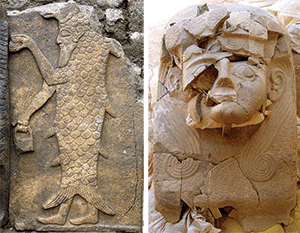
A 14th-century B.C. relief depicts a "fish-man" carrying a pinecone and bucket, symbols
of purification. The head of a sphinx from the same period resembles those found in
the Hittite cities Hattusa and Alaca Höyük in north-central Turkey.
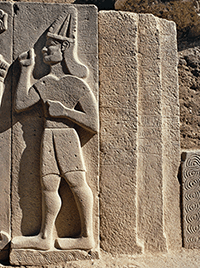
Inscriptions found next to this relief identify the figure as "Taita," ruler of the Patasatini,
who may be the Philistines, often associated with the "Sea Peoples" who ravaged the
Mediterranean world in the 12th century B.C.
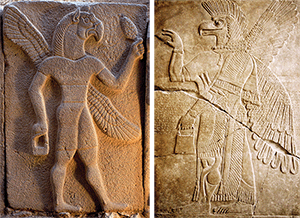
A half-man, half-bird frieze from Aleppo dating to 900 B.C. (left) could have been a model for
artists working 30 years later on the famous reliefs at the Assyrian city of Nimrud.
Photos by Kay Kohlmeyer
To: dr_lew
Thanks dr_lew. Obviously they’ve never seen “Life of Brian”. ;’)
11
posted on
08/19/2012 6:52:58 PM PDT
by
SunkenCiv
(https://secure.freerepublic.com/donate/)
To: BlueDragon
I laughed pretty hard, and felt bad at the same time. Nicely done! :’)
12
posted on
08/19/2012 6:53:18 PM PDT
by
SunkenCiv
(https://secure.freerepublic.com/donate/)
To: SunkenCiv
Thank you for your gracious reply.
I was a little concerned I may offend with that sort of flippancy. I too find it sad that antiquities are being lost.
Some words attributed to that mean 'ol bastard Patton come to mind, also.
These particular fortifications look to have been rebuilt numerous times. I would have like to have seen the doors. Too late now. Hope they spare the really old stuff...
13
posted on
08/19/2012 8:46:46 PM PDT
by
BlueDragon
(going to change my name to "Nobody" then run for elective office)
To: dr_lew
Milleniums just sounds uneducated. I prefer to stick with the Latin plurals for Latin words.
14
posted on
08/20/2012 7:16:22 AM PDT
by
ThanhPhero
(Khach hanh huong den La Vang)
To: ThanhPhero
Milleniums just sounds uneducated.More like "public school" but I guess that is pretty much the same thing.
15
posted on
08/20/2012 7:19:21 AM PDT
by
arthurus
(Read Hazlitt's Economics In One Lesson)
To: BlueDragon
16
posted on
08/20/2012 5:54:49 PM PDT
by
SunkenCiv
(https://secure.freerepublic.com/donate/)
Disclaimer:
Opinions posted on Free Republic are those of the individual
posters and do not necessarily represent the opinion of Free Republic or its
management. All materials posted herein are protected by copyright law and the
exemption for fair use of copyrighted works.
FreeRepublic.com is powered by software copyright 2000-2008 John Robinson




 <>
<>


